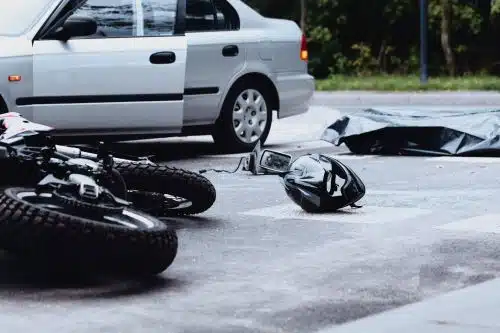When it comes to motorcycle accidents versus car accidents, the differences go far beyond just the type of vehicle involved.
Motorcyclists are exposed to heightened risk compared to the average car driver, and they are far more likely to sustain catastrophic injuries. In fact, motorcycles only make up 3% of all registered vehicles in the U.S., but motorcyclists accounted for 14.6% of all traffic fatalities in 2022.
The extreme nature of motorcycle accidents can be traumatic, but it also incurs different legal and insurance-related challenges. Additionally, many motorcyclists are negatively impacted by unfair biases that sway their claims and compensation.
While both car and motorcycle accidents share the same fundamental legal principles—fault, negligence, and compensation—the way these claims unfold can differ significantly.
Here’s a closer look at how motorcycle accident claims are distinct from car accident claims and what injured riders need to know to protect their rights.
Injury Severity and Compensation Differences
No matter how you slice it, riding a motorcycle is almost always more dangerous than driving a car.
The National Highway Traffic Safety Administration has indicated that the number of people who die from motorcycle accidents is almost 24 times the number of people who die from car accidents per mile traveled.
This data highlights how exposed motorcyclists are on the road. Unlike cars, motorcycles offer no structural protection, seat belts, or airbags. As a result, riders are more vulnerable to catastrophic injuries such as:
- Traumatic brain injuries (TBIs)
- Spinal cord injuries
- Compound fractures
- Road rash requiring extensive skin grafts
Because of the severity of these injuries, the compensation for motorcycle accidents is often higher than that of car accidents. Motorcycle accident victims may need extensive medical treatment, rehabilitation, and ongoing care, which increases the potential value of their claim.
Insurance Company and Legal Challenges
Unfortunately, motorcyclists often face unfair biases when dealing with insurance companies and in court. Insurers may argue that motorcyclists are reckless or assume they contributed to the accident. This can lead to lower settlement offers or even denied claims.
Additionally, many states follow comparative negligence laws, meaning a motorcyclist’s compensation may be reduced if they are found partially at fault. Insurance companies may attempt to shift blame onto the rider, even when the accident was caused by a negligent driver.
Policy Limitations and Coverage Issues
Motorcycle insurance policies are often structured differently from car insurance. Some insurers limit coverage for motorcycle-related injuries, leaving riders with fewer options for medical bill reimbursement. This can force victims to seek compensation from the at-fault driver’s insurance or through legal action.
In some cases, uninsured/underinsured motorist (UM/UIM) coverage becomes critical. If a driver without sufficient coverage causes a motorcycle accident, the rider may have to rely on their own UM/UIM policy to recover damages.
Common Causes of Motorcycle Accidents
Left-Turn Collisions
One of the most common causes of motorcycle accidents is left-turn collisions at intersections. A driver making a left turn may fail to see an approaching motorcycle or misjudge its speed, resulting in a crash.
These accidents often lead to severe injuries due to the direct impact on the motorcyclist.
Road Hazards and Weather Conditions
Unlike cars, motorcycles are more vulnerable to road hazards, such as:
- Potholes
- Gravel or debris
- Wet or icy roads
- Uneven pavement
A minor road defect that might go unnoticed by a car driver could cause a motorcyclist to lose control, leading to serious injuries.
Distracted or Impaired Drivers
Motorcyclists are also at higher risk of accidents caused by distracted or impaired drivers. Texting while driving, drunk driving, and failing to check blind spots are leading contributors to motorcycle crashes.
Seeking Compensation After a Motorcycle Accident Injury
Motorcycle accident claims aren’t like other injury cases. With high medical bills, uncooperative insurance companies, and unfair stereotypes working against you, the road to compensation can be rough.
That’s why you don’t just need a lawyer—you need one who understands the specific battles motorcyclists face.
A trained motorcycle accident attorney knows how to fight back against bias, build a rock-solid case, and demand the full payout you’re owed. They will also help:
- Uncover the evidence needed to prove fault and shut down unfair assumptions.
- Take on insurance companies that try to minimize or deny your personal injury claim.
- Push for maximum compensation, including long-term care and lost wages.
When the system works against you, having a skilled advocate in your corner can be the difference between getting short changed and getting what you truly deserve. Contact a motorcycle accident lawyer to discuss the specifics of your case.
In Summary: The Right Approach Matters for Motorcycle Accidents
Motorcycle accident cases aren’t just more complicated than car accident claims—they’re often an uphill battle.
With severe injuries, aggressive insurance tactics, and legal hurdles at every turn, riders typically have to fight harder to get the compensation they deserve. Additionally, they probably need the support of a specialized lawyer to get what they’re owed.
When the stakes are high, having a personal injury lawyer who knows how to take on insurance companies and push for the maximum payout can make all the difference. Don’t treat your case like a simple car accident—acknowledge the unique circumstances of motorcycle accidents.
Keep an eye for more latest news & updates on Essential Tribune!








